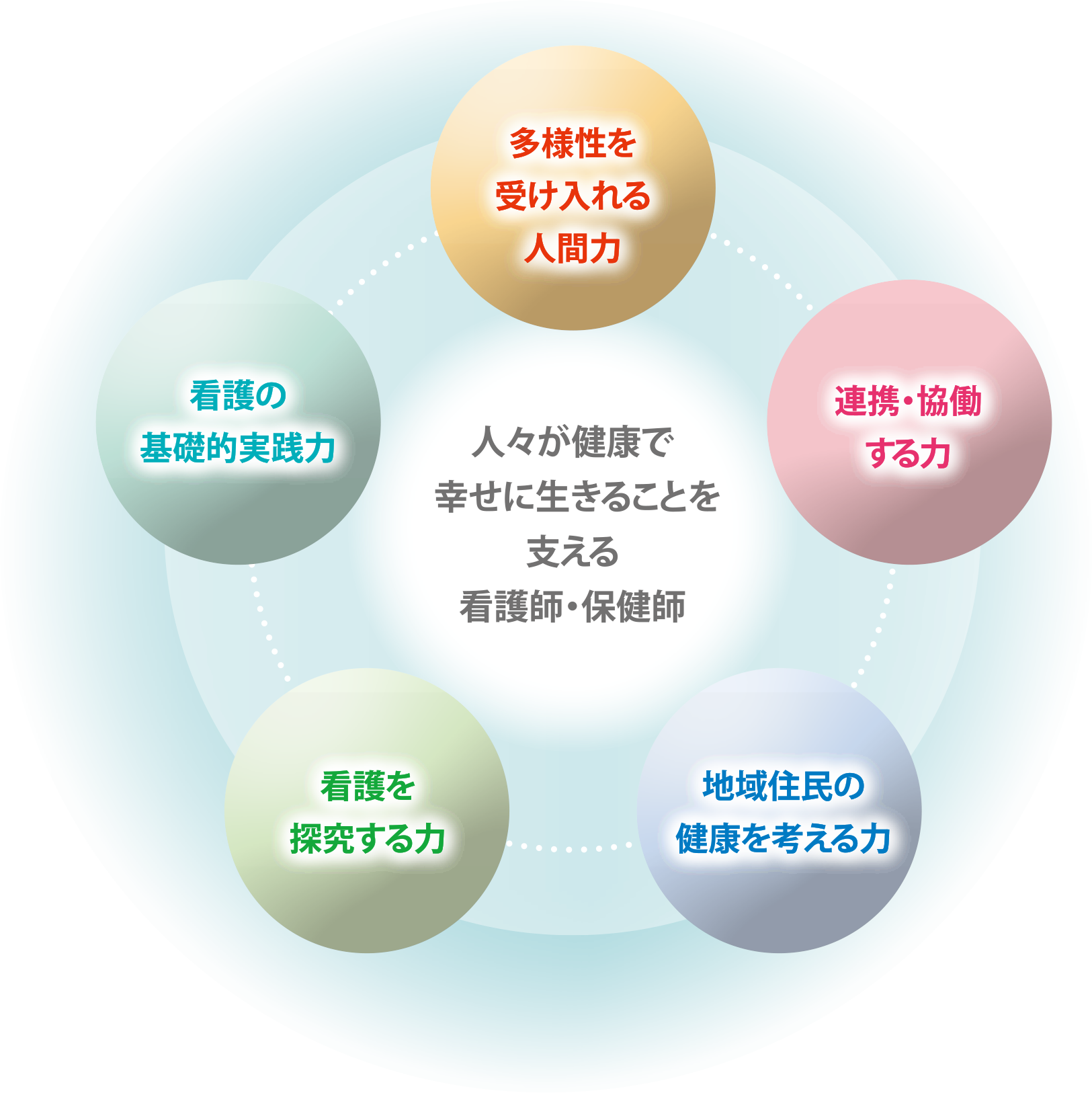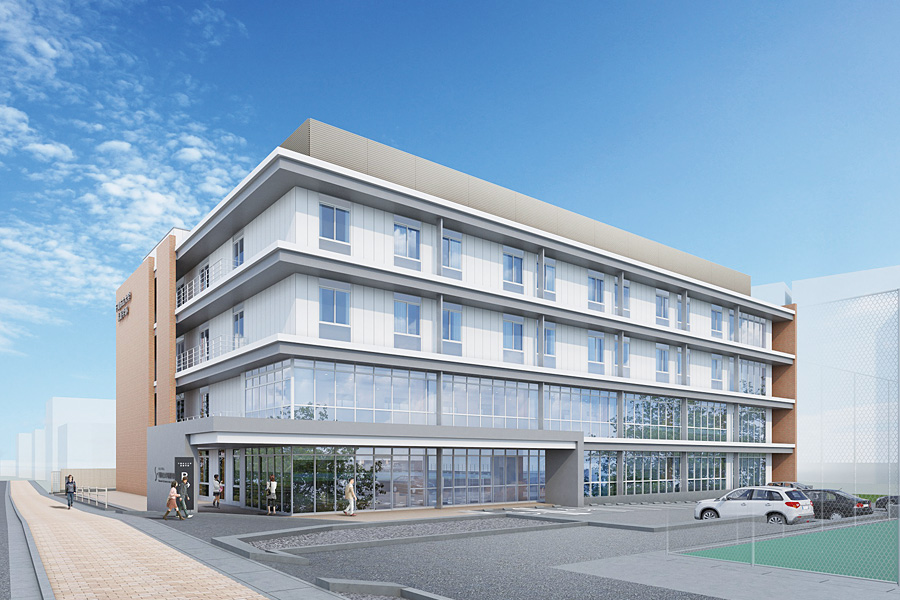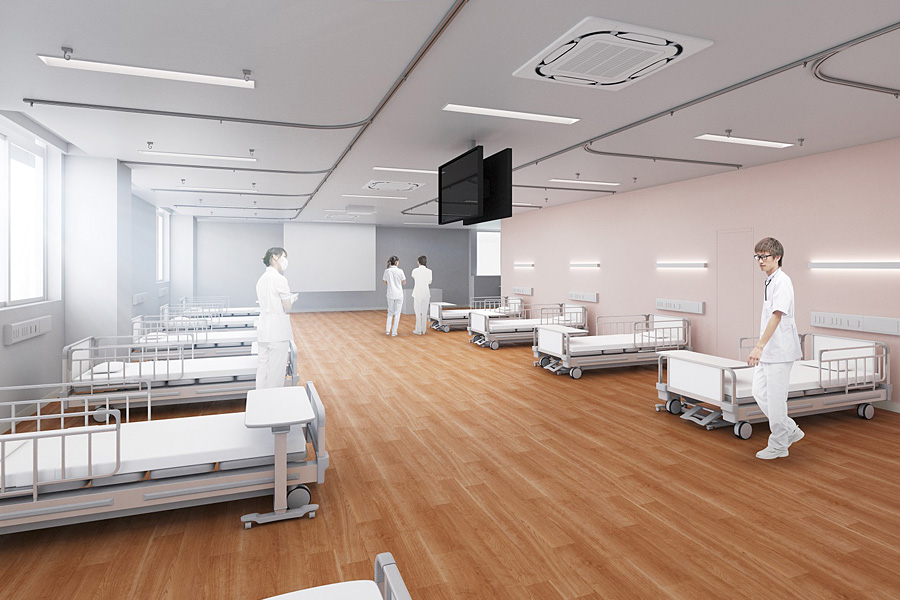- Home
- Faculty, Department, Graduate School
- Faculty of Nursing Scheduled to open in April 2025
- Department of Nursing
Faculty of Nursing Scheduled to open in April 2025
Department of Nursing

5 years and 10 years ahead, acquire nursing practice skills to support people.
In an era where changes are remarkably unpredictable in the future, we need nursing personnel who can act to discover and improve people's health issues. Shimonoseki City University trains nursing professionals who support people living in the Shimonoseki / Kanmon area to live like that person and live healthy and happy in places where people live, not just medical institutions and recuperation facilities.
The expected course
● Medical institutions
● Government agencies (health centers, health centers, etc.)
● Companies with Health Management Offices
● School nurses (elementary schools, junior high schools, high schools, etc.)
● Entering school (midwife training institution, graduate school, etc.)
Licenses and qualifications that can be obtained
Acquisition of eligibility for examination
● Nurses National Examination Qualifications
● Qualifications for National Public Health Nurse Examination (by taking a separate public health nurse course)
Licensing and Qualification
● A nursing teacher's license ※(Department of teaching course)
● Two-class nursing teacher license (application after obtaining a public health nurse license)
● Type 1 hygiene manager's license (application after obtaining a public health nurse's license)
- I am applying for teaching course certification. However, as a result of the examination by the Ministry of Education, Culture, Sports, Science and Technology, the scheduled opening time of the teaching course may be changed.
Policy for Graduation Accreditation and Degree Grant Diploma Policy
- A.
- Knowledge and understanding
- DP1_ A wide range of cultures to understand diverse people and their lives, society and culture.
- DP2_ Understand the target of nursing (individuals, families, groups, and local communities) from multiple perspectives and acquire basic knowledge to practice appropriate nursing.
- B.
- Versatility Skills
- DP3_ High-quality nursing can be practiced based on scientific evidence for the target of nursing (individuals, families, groups, and local communities).
- DP4_ Understand the role of nursing professionals in the field of health care and welfare, and cooperate and collaborate with multiple occupations.
- C.
- Attitude and orientation
- DP5_ Respect the lives, dignity, and rights of people and act based on a sense of ethics and mission as a nursing professional.
- DP6_ We have self-improvement skills to enhance our own nursing practice skills.
- D.
- Integrated learning experience and creative thinking
- Use DP7_ Information and Communication Technology correctly to explore nursing.
- DP8_ You can think creatively about nursing from a regional and global perspective.
Policy for organizing and implementing curriculum Curriculum policy
- 1.
- In order to acquire a wide range of culture and cultivate a foundation for understanding diverse people and their lives, society and culture, we will assign basic education subjects and liberal arts education subjects. Basic education subjects are "Foreign Languages", "Information and Mathematical", liberal arts education subjects are "Liberal Arts" (humanities / social science / natural science / life / health science / human rights / symbiosis), and "Shimo-Kwansei Gakuin". By taking a wide range of courses from all fields, students can capture the diverse values of nursing subjects with a rich mind and flexible mind, and cultivate diversity.
- 2.
- In order to understand the subjects of nursing (individuals, families, groups, and local communities) from various perspectives and to cultivate a foundation for practicing high-quality nursing based on scientific evidence, specialized basic education subjects are "human body structure and function I, II, III, IV", pharmacology, nutrition and metabolism, and subjects related to the social security system are systematically arranged.
- 3.
- Lectures, exercises, and practical training subjects of specialized education subjects are systematically arranged in order to practice nursing based on specialized knowledge and scientific thinking. Specialized education subjects are organized in five subjects: basic nursing, clinical nursing, nursing for children and families, community nursing, and integration of nursing. Courses to learn healthcare as nursing that supports a healthy and healthy life regardless of health or unhealthy, such as "Life Stage and Healthcare Overview I ・ II", "Child Healthcare Methodology I ・ II", "Adult Healthcare Methodology I ・ II", etc. In order to explore nursing and develop the ability to think creatively, "Introduction to Nursing Research" and "Nursing Research Exercise" are arranged, and "International Health Nursing" is placed so that health issues can be considered from a regional and global perspective. I will do it. Lectures and exercises incorporate a variety of learning methods, including the use of ICT and active learning, depending on the type of class.
- 4.
- In the on-site training, taking advantage of the characteristics of public universities closely related to the community, we will cultivate the foundation of the ability to think about the health of local residents by conducting on-site training in Shimonoseki and surrounding areas, including `` practical training to know living and the community '' . In addition, in order to understand the specialty of nursing and acquire the ability to cooperate and collaborate with multiple occupations in various places of health and medical welfare, at the end of the third year's on-site training, `` Multi-occupation Cooperation Training '' Place. Furthermore, in the 4th year of “Integrated Nursing Practice”, students will develop their own practical training tasks and develop their self-improvement skills to enhance their ethics and mission as a nursing professional, and their ability to practice nursing.
- 5.
- Osamu Gaku Osamu's achievements are strictly evaluated based on the Diploma Policy based on the grade evaluation criteria set for each subject. Through the introduction of a portfolio, Osamu Gaku will be visualized so that students can evaluate themselves.
Education curriculum
| 1 year | 2 years | 3 years | 4 years | ||
|---|---|---|---|---|---|
| Specialty Gate Teaching Education |
Health Promotion* Care ring* Overview of Nursing Communication theory* Nursing Career Design* Life assistance technology |
Health assessment Medical assistance technology Nursing process Nursing management and medical safety Nursing ethics Life Stage and Healthcare Overview I Life Stage and Healthcare Overview II Adult Healthcare Methodology I Geriatric Healthcare Methodology I Geriatric Healthcare Methodology II Child Healthcare Methodology I Women's Health Care Methodology I Overview of Mental Healthcare Mental Healthcare Methodology I Overview of Regional and Home Healthcare Regional and Home Healthcare Methodology I Overview of Public Health Nursing Introduction to Health Behavioral Science * Health Behavioral Science Methodology* Public Health Nursing Activity Theory I* |
Adult Healthcare Methodology II Introduction to Nursing Research Child Healthcare Methodology II Women's Health Care Methodology II Mental Healthcare Methodology II Regional and Home Healthcare Methodology II Comprehensive nursing skills exercise Public Health Nursing Activity Theory II Public Health Nursing Activity Theory III School Health* Overview of Nursing Care* Health consultation activities* |
Cancer nursing Disaster nursing Family Nursing Rehabilitation nursing* End-of-life care* Emergency nursing* Infection nursing* Nursing theory* Nursing research exercises International Health Nursing Health policy theory* |
|
| Fruit Learning Department Eye |
Practical training to learn about living and the community | Basic Nursing Practice I Basic Nursing Practice II |
Adult Healthcare Practice I Adult Healthcare Practice II Geriatric Healthcare Practice I Geriatric Healthcare Practice II Child Healthcare Practice Women's Health Care Practice Psychiatry Healthcare Practice Multi-professional collaborative training |
Integrated training in nursing Community and Home Healthcare Practice Public Health Nursing Practice* |
|
| Specialty Gate Basis Foundation Teaching Education |
Nursing Informatics Structure and Function I of the Human Body Structure and Function of the Human Body II Clinical Pathology I Clinical Pathology II Start-up seminar Pharmacology Nutrition and Metabolism Public Health |
Clinical Pathology III Clinical Pathology IV Healthcare and Welfare Administration Theory Multi-occupation Collaboration Theory |
Epidemiology and Health Statistics* | ||
| Teaching Nourishing Teaching Education |
Humanities Social Sciences Natural Science Life and Health Sciences Human Rights and Symbiosis Career education Foreign training Shimo-Kwansei Gakuin |
||||
| Basis Board Teaching Education |
Foreign language Information and Mathematics First-year education |
||||
*Elective subjects
※The curriculum is subject to change.
※Liberal arts education and basic education indicate subject categories.
Overview of Nursing Education Program


University Faculty of Nursing's distinctive subject multidisciplinary collaborative training
Students will learn the actual cooperation of related occupations in a comprehensive community care system centered on patients and users as a member of the health care team. Beyond the boundaries of training places (wards and facilities), we will learn about the expertise of various occupations related to the health and medical welfare of people and explore cooperation.
The ability to acquire

Faculty of Nursing New School Building


In addition to the lecture room, the new Faculty of Nursing school building will have a nursing training room and a skill slab, and will introduce simulation education using a large number of high-performance simulators to provide realistic nursing skills education with the participation of residents in the Shimonoseki area as simulated patients. In addition, we have set up many seminar rooms and exercise rooms to promote independent learning, such as group work for students.







